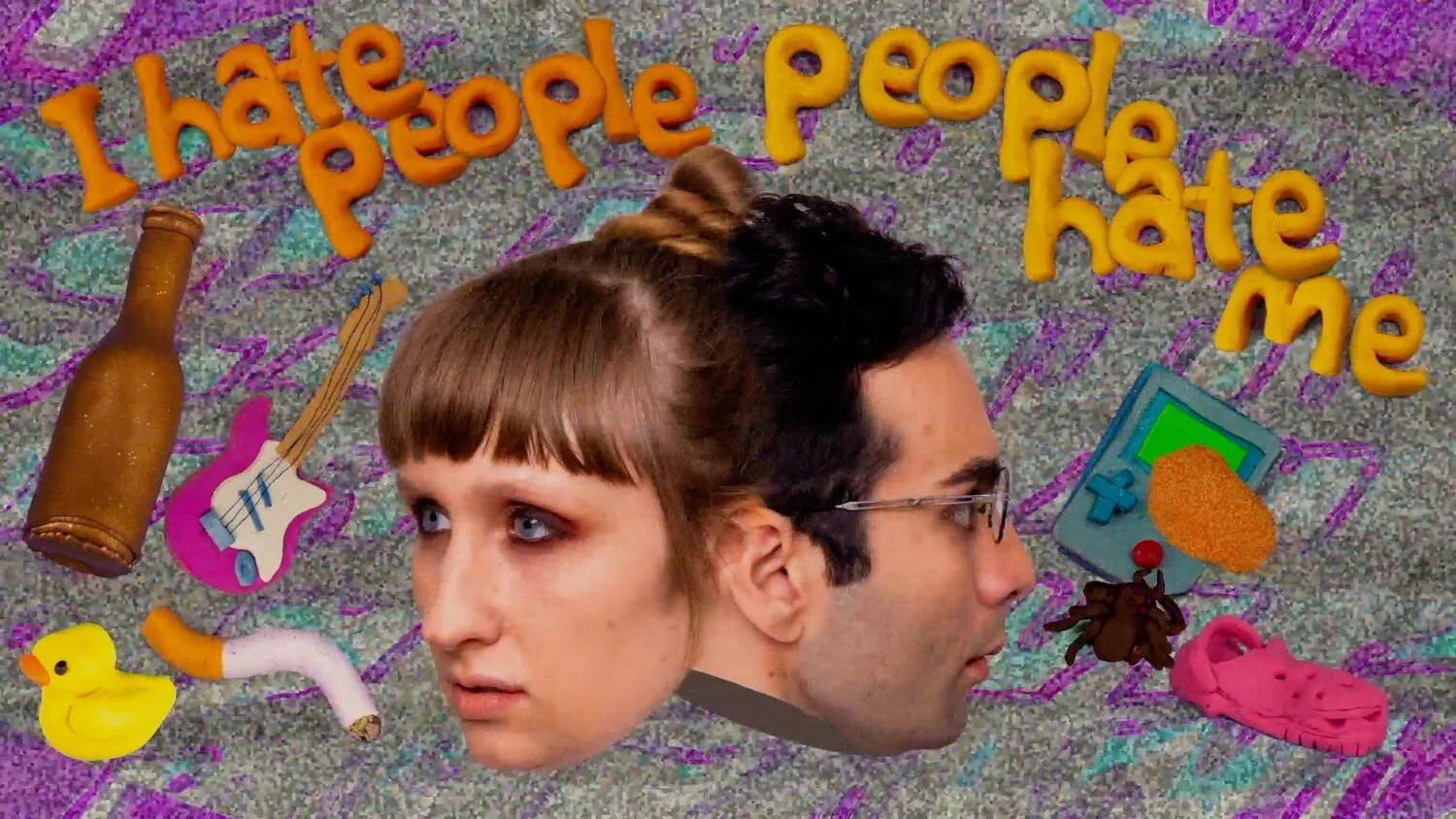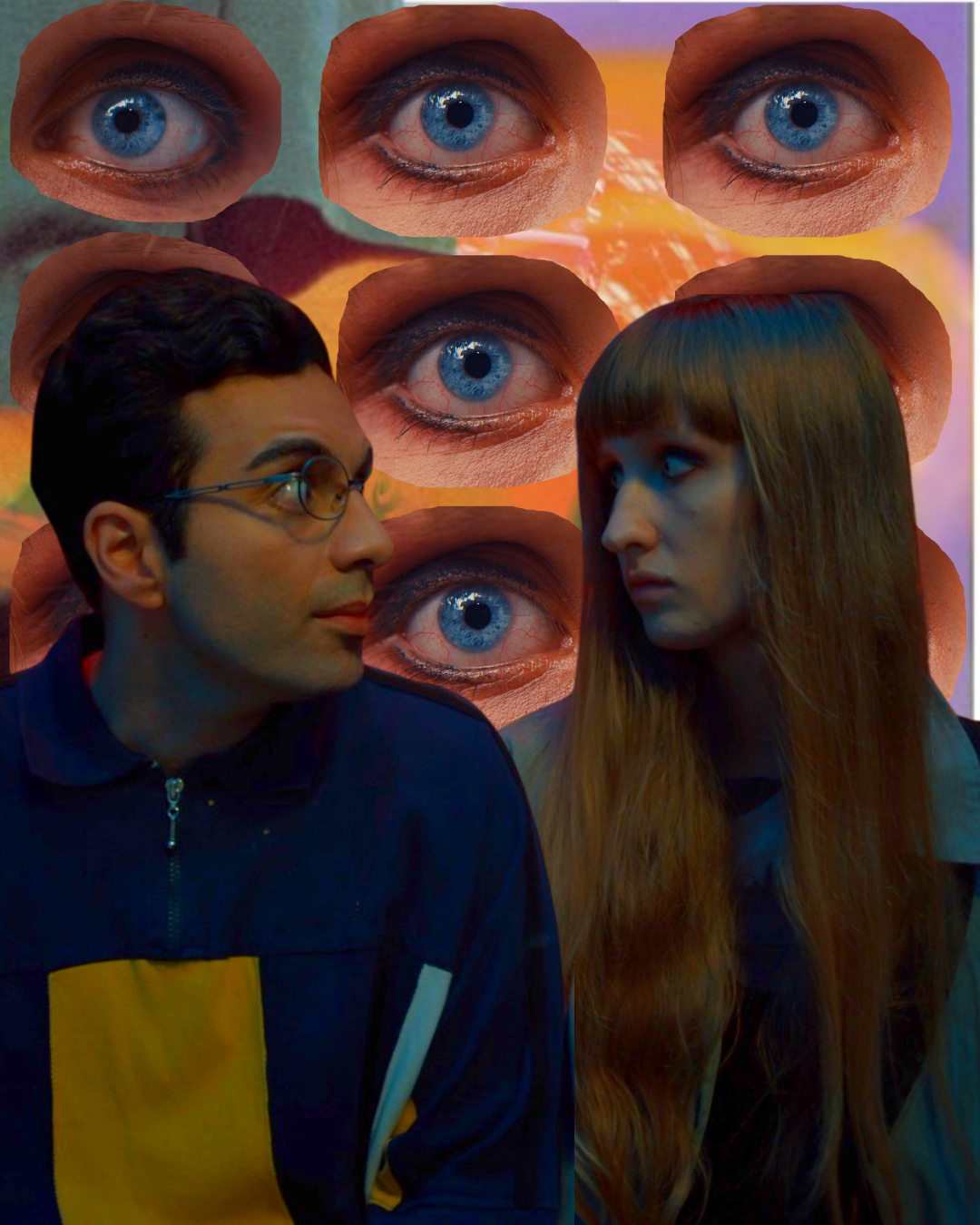Bobbi Summers and Lily Makowski on Hating People, People Hating Them & the Realities of the Queer Experience
Make it stand out
I Hate People, People Hate Me is the type of misanthropic lyric your favourite emo band would scream on the Kerrang! music channel at 12pm on a Saturday and you would scream back. It is also the kind of phrase that you would revisit in the same song ten years later during an emo renaissance that all twenty-somethings experience and think to yourself: That has only gotten truer as I have gotten older.
Well surprise - I Hate People, People Hate Me is not a lyric at all, but the title to Bobbi Summers’ digital series debut exploring queer identity in a time where queerness has no only been mainstreamed, but commodified. Unfortunately, our stories aren’t as simple or straightforward as the ‘finding yourself’ archetype may make it seem. When not fitting into society’s ideals, this new potential upcoming CBC Gem original series is asking who wants to fit into society anyway and more importantly: Isn’t chucking a middle finger up to said societal expectations a lot more fun that bending to fit within them.
Featuring the show’s creator Bobbi Summers as the co-lead alongside stand up comedian Lily Makowski, Polyester asked the pair about the new series, why ‘shit happens’ is more realistic than ‘it gets better’ and the importance of queer storytelling coming from queer creators.
___STEADY_PAYWALL___
I love the show’s tagline “outsiders amongst outsiders” and feel it rings true for anyone who doesn’t fit in with the expectations of their own community, do you think people are blindsided to beauty standards in the queer world as queerness is automatically seen as “beyond” these parameters? And what’s the danger in ignoring these pushed ideals within our community?
Lily: I’d say it goes well beyond beauty standards, but yes, queer communities are presumed to be utopian. In truth, our circles are susceptible to the same forces of hegemony as anywhere else, and the danger of ignoring this is that it allows white supremacy/ ableism/ transphobia/ classism/etc to infiltrate queer spaces and cause further oppression and harm. If we only ever see that utopic version of queerness, it amounts to brushing the uncomfortable truths of our existence under the table. I hope this show can be a small antidote to that.
Bobbi: Ok...I thought maybe you’d start with something lighter, like “Who’s your favorite Jonas Brother?” (It’s Joe). But I’m down to dive right in. Everything Lily said - yes. There’s a lot to be said about the hierarchies that exist within the queer world. For me, though, beyond pointing out bullshit in the world around us, this series is about finding peace IN THE MIDST of the bullshit. It’s like, ok...I’m the victim of a broken machine, maybe I can’t destroy that machine, so how do I not completely break down? It’s about finding acceptance. Like...the only way to escape the machine is to accept the fact that the machine cannot be escaped.
What I loved especially about the clip, and the premise for the whole series, is that more often than not the underdog isn’t a chipper, up and coming Oliver Twist character but a jaded and sarcastic adult. Do you feel there’s a requirement to be likeable to be deemed worthy of sympathy in the media and in real life too?
Lily: More than anything, there’s a pressure to make people comfortable. In both media and life, people want the version of you that’s in line with their assumptions, and makes you an object of pity or scorn. Either way, you end up an object, because people don’t want to sit in the messy contradictions of someone’s three-dimensional humanity. It’s a lot of work! And complicated people tend to be inconvenient. Something Bobbi and I have talked about a lot is the idea of letting queer people be people first, and not just a version of their identities.
“If we only ever see that utopic version of queerness, it amounts to brushing the uncomfortable truths of our existence under the table.”
Bobbi: I hope that the characters’ likeability stems from their relatability, but likability was never my main concern. With comedy, I need to let all the ugly hang out and not try to control how I’m being perceived, or whether my hunchback is really prominent in a certain shot, or whatever. It’s counterproductive. It kills the comedy. That was my biggest take-away from the first day on set.
Continuing on the above point, is there any worth in trying to be more likeable when interacting with other people or is the misanthropy of Jovi and Tabitha similar to your own takes on the world?
Lily: I think we both have that side to ourselves, as does any marginalized person. I can be okay sometimes and full “fuck everything, it doesn’t get better” Tabi-mode at others. They’re usually in competition, honestly. For me, Tabitha is like the Id for all my darkest impulses, which is quite freeing to play. But it’s crucial to understand that Jovi and Tabitha are that way because they’ve had to be for so long in order to survive. The arc Bobbi has written so beautifully into the series is them being confronted with the idea that “yes, it’s like that, but not always. There can be light, sometimes.”
Bobbi: There CAN be light sometimes… if you squint really hard, you might catch a tiny glimmer of it in the hauntingly dark abyss that is day-to-day life. Listen, do I hate the world? Absolutely. Will I make it any better by deliberately being a miserable cunt? Absolutely not. For my own sanity, I try to lead with optimism and kindness. I fall short, a LOT, but I try to recognize when I’ve fallen short, and then I course-correct.
Although obviously the show is set in Toronto, as a Welsh woman I found the jokes really typical of Britain’s dry wit. Where do you find the inspiration for your sarcasm and humour?
Bobbi: Thank you so much for saying that, I take it as such a huge compliment. I’m such a fan of In-Betweeners and Mad Fat Diary and other British series. I don’t know where my dry humor came from exactly… my parents are assholes, that’s probably part of it.
Lily: I’m a pretentious maniac, so when it came to developing the performance, I mostly watched sad arthouse movies for inspiration.
If you can avoid spoilers, what was your favourite scene to film together or even any solo scenes that particularly stand out?
Lily: Because it was mostly just Bobbi and I for rehearsals, we still got to do every scene together off-camera, which was a huge asset for developing our chemistry. For me, the standout is the coffee-stealing scene. That was the one in rehearsals where everyone was like “this is gonna be so fuckin’ funny,” and our theft target, Sylvan [Vallardes], was incredible on the day of. No spoilers, but there’s a Tabitha storyline in episode two that’s so funny. I was like “I have to get this part just so I can do this.” I can’t wait to shoot that one.
Bobbi: The opening scene of the teaser was really fun to film, Lily wrote some jokes that KILLED me during filming, even though I’d heard them like a thousand times in rehearsal. It was special to film at Sneaky Dee’s, the actual bar where I’d lived out parts of my life that went on to inspire the series. ALSO, no major spoilers, but I’m excited about a scene I just wrote where Jovi goes to a skate park and confides in a hot sk8er-guy about his anxieties.
Bobbi, as the writer and co-lead in your debut series, how was it navigating both roles and did seeing your words turning into filmed scenes change any of the meanings you had for lines or scenes while writing them?
Bobbi: Honestly, I’m still learning. I’d like to say I’m versatile, but as with most homosexuals who say that, it’s not entirely the truth. I’m definitely more comfortable writing than performing, but I’m open to challenging myself and rising to the occasion as a “lead”. As for the dialogue coming to life - Lily, Blake (director) and I reworked a lot, and while stuff didn’t necessarily take on new meaning, it definitely all became more realized.
Lily, as you usually work as a stand up comedian, what differences do you find in translating humour for the screen and since filming the show, do you see yourself doing comedic acting more regularly?
Lily: I think one of the bigger lessons we both encountered was that the camera is such a different means of transmission than the human eye. As a stand-up, you get used to having to play to the back row, so your movements and expressions become very heightened. The note Blake [Mawson] was always giving us through rehearsals—and especially me, because Bobbi’s stage persona is more deadpan—was “less! do less!” It was hard to trust in that, especially without people laughing in real time. There were so many times between takes where we’d be whispering like “was that funny? I think that was funny, right?” I’m pretty sure the sound guys know more about our neuroses than our therapists, at this point. But yes, it’s something I see myself doing more of, if the opportunity arises. When Bobbi reached out to me about auditioning, and asked if I could act, I was like “I don’t think so, but I’ll try!” I’m grateful this has shown me I’m more capable of it than I realized.
With a largely queer cast, writer and director, do you think working specifically with queer creatives enhances your work and/or the messages within your work?
Lily: Absolutely. Beyond the fact that you really have to know that experience firsthand in order to portray it faithfully, and how that informs the tone and sensibility, it was crucial to the working environment. Knowing I was working with other queer people on this made me so much more comfortable and allowed me to both trust in the process and voice my ideas much more willingly, which fed the collaborative feel of it all. Bobbi and Blake allowed me a degree of agency over my character that I think is quite rare, still, and I’m very happy about that. Whereas if I was the only trans woman on a set of cishet people, I’d feel so terrified and alone that if they pitched me on some horribly transphobic scene I’d probably just be like “uhh, y- yes, okay Mx. Employers, whatever you say! Please don’t hurt me!”
Bobbi: Honestly, it was nice to know I could throw out a Chromatica reference at work and not have it fall on def ears. I just love queer people so much. I’m grateful we all found each other.
And finally, what do you hope people take away after watching I Hate People, People Hate Me?
Lily: That queer people can be messy, imperfect, and kinda impulsively shitty sometimes, just like anyone else. And not only is that normal and okay, but it can be super goddamn funny too. And you’re allowed to laugh at it. We’re experts in transforming our own pain into levity, and to ignore that truth is to ignore the fullness of our humanity. I think Bobbi has written a really incredible argument to that effect, and I’m excited for people to see more of it.
Bobbi: Sometimes the wind gets really vicious because it’s forcing you in the direction you need to go. But trust the wind, have faith in how it blows.
Words: Gina Tonic


